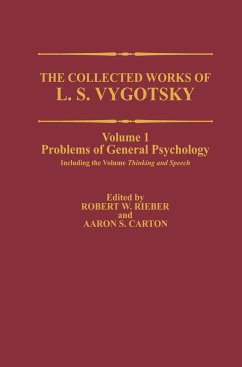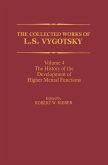Vygotsky was a Russian psychologist and one of the most influential psychologists in the world during the 20th century. This volume, the first of six, examines Vygotsky's works involving problems of general psychology, including thinking and speech.
The Collected Works of Lev Semonovich Vygotsky comprise a series of six volumes, originally published in Moscow by Pedagogika between 1982 and 1984 and comprising the work done by Vygotsky between 1924 and his early death in 1934. The present vol ume is the first of this series to appear in English but it is actually Volume 2 in the Russian series. It contains a complete rendition of Thinking and Speech (which may be known to English readers as Thought and Language, the title assigned to an abridged, interpretative translation by Hanfmann and Vakar in 1962) and five Lectures in Psy chology which are here published for the first time in English and essentialIy comprise Vygotsky's systematization of psychological theory and data in respect to the develop ment in childhood of perception, memory, thinking, emotions, imagination, and will. The volumes which are yet to appear in English are respectively concerned with: (1) theory and history of psychology; (2) problems of developmentalpsychology; (3) child and adolescent psychology; (4) "defectology" (or "special education" in American par lance); and (5) a "scientific archive" consisting of a critique of Spinoza's studies of the passions and an important essay, "Tool and Sign. " The decision by the Translator and Editors to render the title of the first segment of this volume, Mysclzlenie i Rech', as Thinking and Speech and not as Thought and Language, as it was previously translated, was a very intentional one.
The Collected Works of Lev Semonovich Vygotsky comprise a series of six volumes, originally published in Moscow by Pedagogika between 1982 and 1984 and comprising the work done by Vygotsky between 1924 and his early death in 1934. The present vol ume is the first of this series to appear in English but it is actually Volume 2 in the Russian series. It contains a complete rendition of Thinking and Speech (which may be known to English readers as Thought and Language, the title assigned to an abridged, interpretative translation by Hanfmann and Vakar in 1962) and five Lectures in Psy chology which are here published for the first time in English and essentialIy comprise Vygotsky's systematization of psychological theory and data in respect to the develop ment in childhood of perception, memory, thinking, emotions, imagination, and will. The volumes which are yet to appear in English are respectively concerned with: (1) theory and history of psychology; (2) problems of developmentalpsychology; (3) child and adolescent psychology; (4) "defectology" (or "special education" in American par lance); and (5) a "scientific archive" consisting of a critique of Spinoza's studies of the passions and an important essay, "Tool and Sign. " The decision by the Translator and Editors to render the title of the first segment of this volume, Mysclzlenie i Rech', as Thinking and Speech and not as Thought and Language, as it was previously translated, was a very intentional one.
From a review of a previous volume:
"Although the writings in this volume were composed over 60 years ago [...] everything we teach today in this area is here[...] the reader can appreciate how valuable and how modern are the insights presented [...] worthwhile."
(Contemporary Psychology)
"Although the writings in this volume were composed over 60 years ago [...] everything we teach today in this area is here[...] the reader can appreciate how valuable and how modern are the insights presented [...] worthwhile."
(Contemporary Psychology)
`Although the writings in this volume were composed over 60 years ago, most of the conceptualizations offered are wholly current and contemporary....Everything we teach today in this area is here....Exceedingly valuable. The reading will not be easy, but it certainly will be worthwhile.' Contemporary Psychology, from a review of Volume 2 `All academic libraries, even those in two-year colleges, should add these volumes to their collections.' Choice, February 1998 `Volume 3 reveals Vygotsky's powerful philosophical vision far more richly than previously translated materials...The Collected Works in English are particularly valuable because a broad and honest reading of Vygotsky challenges common assumptions about psychology. By building on Vygotsky's more promising insights, psychology might have a better chance of overcoming the divisions it still faces.' American Scientist, May - June, 1998
`Although the writings in this volume were composed over 60 years ago, most of the conceptualizations offered are wholly current and contemporary....Everything we teach today in this area is here....Exceedingly valuable. The reading will not be easy, but it certainly will be worthwhile.'
Contemporary Psychology, from a review of Volume 2
`All academic libraries, even those in two-year colleges, should add these volumes to their collections.'
Choice, February 1998
`Volume 3 reveals Vygotsky's powerful philosophical vision far more richly than previously translated materials...The Collected Works in English are particularly valuable because a broad and honest reading of Vygotsky challenges common assumptions about psychology. By building on Vygotsky's more promising insights, psychology might have a better chance of overcoming the divisions it still faces.'
American Scientist, May - June, 1998
Contemporary Psychology, from a review of Volume 2
`All academic libraries, even those in two-year colleges, should add these volumes to their collections.'
Choice, February 1998
`Volume 3 reveals Vygotsky's powerful philosophical vision far more richly than previously translated materials...The Collected Works in English are particularly valuable because a broad and honest reading of Vygotsky challenges common assumptions about psychology. By building on Vygotsky's more promising insights, psychology might have a better chance of overcoming the divisions it still faces.'
American Scientist, May - June, 1998









